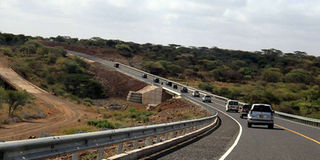Traders turn Isiolo-Moyale road into corridor for illegal goods

This image taken on January 29, 2019 shows the Isiolo-Moyale highway at Logologo in Marsabit County. Some traders use this road to bring in contraband. PHOTO | FILE | NATION MEDIA GROUP
What you need to know:
- Some rogue traders manipulate the free movement to bring in huge consignments of goods duty-free for sale to other parts of the country.
- Security laxity along the highway to Nairobi, where officers are bribed to look the other way, allows for easy entry of goods.
Development projects are supposed to uplift people’s living standards and improve a region’s economy.
While that is what informed construction of the Trans-Africa highway connecting Kenya to Ethiopia, unscrupulous businesspeople have turned the project into a highway for illegal trade.
Since the completion of the highway in 2017, Kenya has become a destination of illegal goods and drugs with Moyale town being the illicit trade centre.
Last week, police in Kasarani, Nairobi, intercepted marijuana worth Sh8 million being ferried in a fuel tanker from Ethiopia.
The ambush not only exposed the magnitude of the trade, but also exposed security laxity along the northern corridor.
Ferrying illegal goods has become the norm after the smooth, high class road was opened two years ago.
TRADE
Experts project that trade between Kenya and Ethiopia will grow to Sh17.7 billion this year, up from Sh7bn last year, thanks to the 895-kilometre highway and the one-stop border post in the town.
This data bears testimony to the importance of the corridor to trade. In Moyale, a border control was set up to regulate what enters and leaves the country.
“You may not be able to trade on equal basis. Sometimes you have more coming in. That is an issue the country needs to look into to see what more we can take to Ethiopia,” Immigration Principal Secretary Gordon Kihalangwa said.
At the border, the customs department checks goods coming in and fees are paid. But with the porosity of the border, not all goods go through the customs office.
POPULAR GOODS
While some residents stock up food for household consumption, some rogue traders manipulate the free movement to bring in huge consignments of goods duty-free for sale to other parts of the country.
“In Ethiopia, food is very cheap and readily available. When food comes from down (Kenyan farmlands), traders sell it at higher prices because of transport and other costs,” Moyale resident Khalif Hassan says.
Rice, sugar, cereals and miraa are among the most smuggled goods through Moyale into the country. Cosmetics have also found a major market in the border town.
On the Ethiopian side, chains of warehouses and wholesale depots sit near the border targeting mostly Kenyan distributors and traders.
While this eases the burden for Moyale residents on the Kenyan side, most traders evade tax either by importing in small portions or using unmanned routes.
“Nobody will bother you when you carry a sack of rice or sugar across the border. And when you have a lot of goods, you can use other routes away from the border control. No police officers man them, and one can ferry goods in pick-up trucks,” Mr Hassan said.
DRUG TRAFFICKING
He adds: “Some come from Kismayu through Somalia to Ethiopia. Somalis are the biggest source of these goods.”
It is through the unguarded routes that narcotics, mostly marijuana, find their way into Kenyan. Although the drug is illegal in Ethiopia, it is widely grown and has a major market in Kenya.
Security laxity along the highway to Nairobi, where officers are bribed to look the other way, allows for easy entry of goods. Immigration proposes a multi-agency approach to fix the menace.




